The days of children playing outside until dusk, riding their bikes through the neighborhoods, and using their imagination to create playground games could be long behind us. The advent of the internet, video games, and handheld devices has taken many children away from spending their time outdoors. The brilliant minds behind the development of this technology know firsthand how addictive these products can be, and many attempt to limit the access their own children have to such technology.
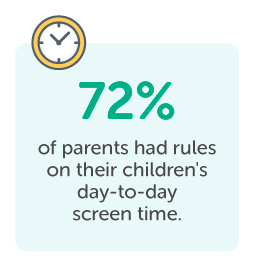
More and more, parents are limiting their children's screen time at a young age. As we found, 72% of parents had rules regarding the amount of time their children spent in front of the screen every day.
But are certain parents more likely than others to pay attention to the effects of technology? Does income have anything to do with it – and the ability to provide children with alternatives? Do parents actually limit their children's screen time, or are they just worried about it? We surveyed over 1,000 parents from various backgrounds to see just how they regard this technological boom and its effect on their children's life.
Obeying the Rules
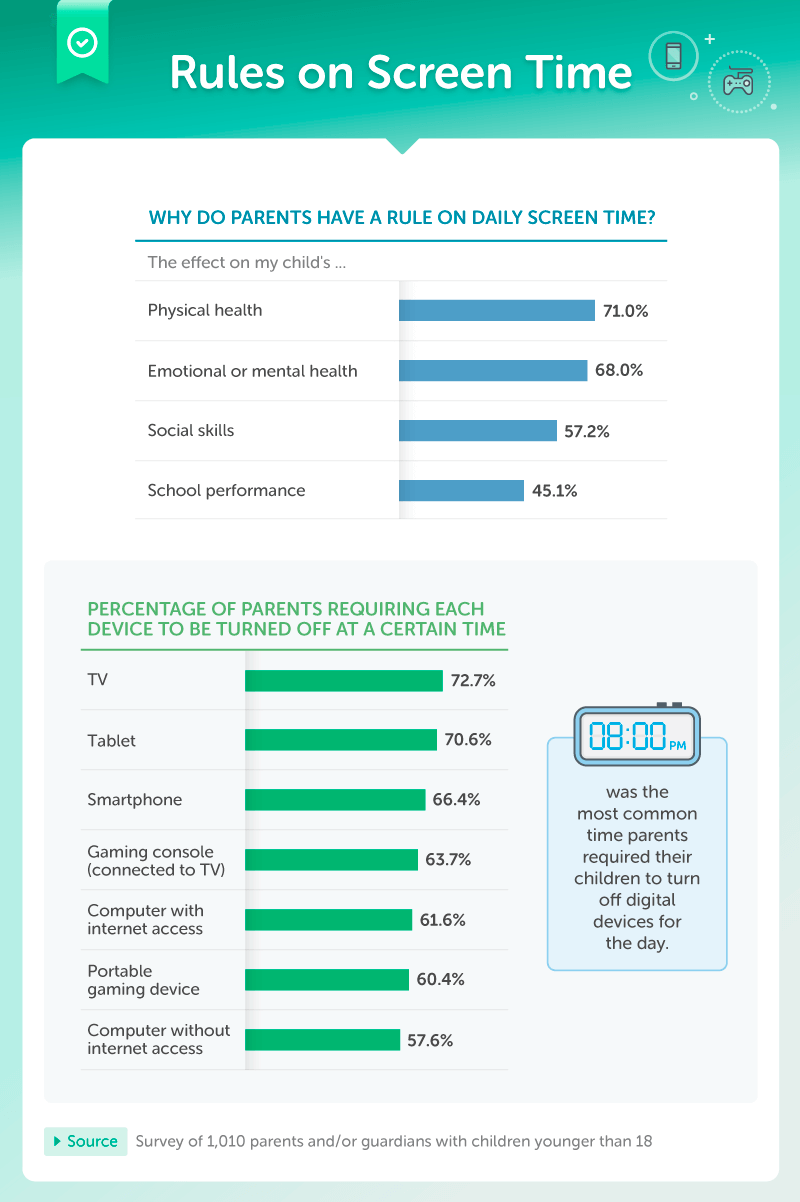
Parents can set themselves apart from others with the rules they place on their children. Different parenting styles call for different rules and varying degrees of enforcement. In fact, 71% of parents surveyed cited physical health concerns as the main reason for limiting their children's time with technology on a day-to-day basis.
TV appeared to be the biggest issue, as nearly 73% of parents put a restriction on their children's daily time in front of the television. Most TVs on the market now are "smart," which means content can be accessed on the internet. That may be why children who did not have internet on their computers had the fewest parents restricting their access.
The time of day that parents most often required their children to turn off their digital devices was 8 p.m., just as kids may be getting ready for bed. Turning off electronics before bed is one of the most common features of a good night's sleep. Sleep is important for a child's growing mind, as it helps to improve their attention span, behavior, learning, memory, and overall mental and physical health. By shutting down electronic devices, children can settle into bed with a clear head, and parents can rest easy knowing there are no tablets, laptops, or cellphones jumping into bed alongside them.
Shutting Down Devices
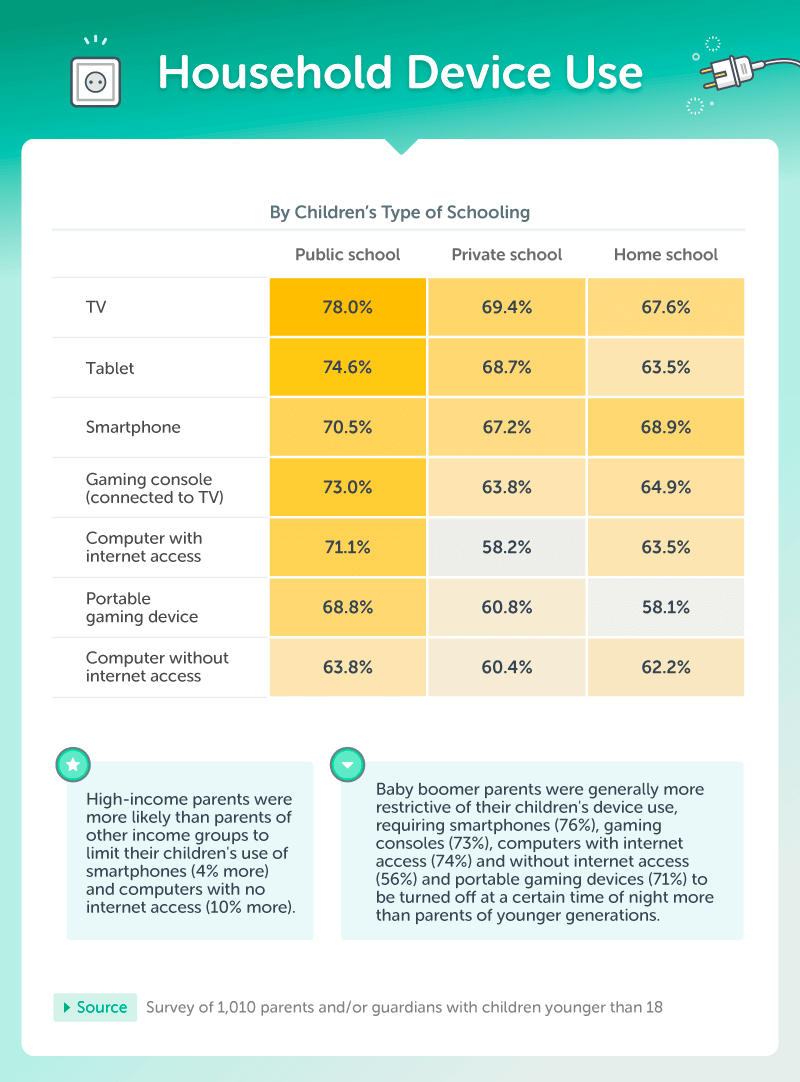
It seems that parents have differing opinions regarding which digital devices utilized by their children are worse than others.
When looking at children's type of schooling, the most strict parents were those whose children were in public school, as these parents required their children to turn off their devices at a certain time in all cases more than others. Parents of public school-educated children placed restrictions on TV and tablets the most. Research shows that watching TV may pose the biggest threat to children's developmental and physical well-being.
The Digital Age
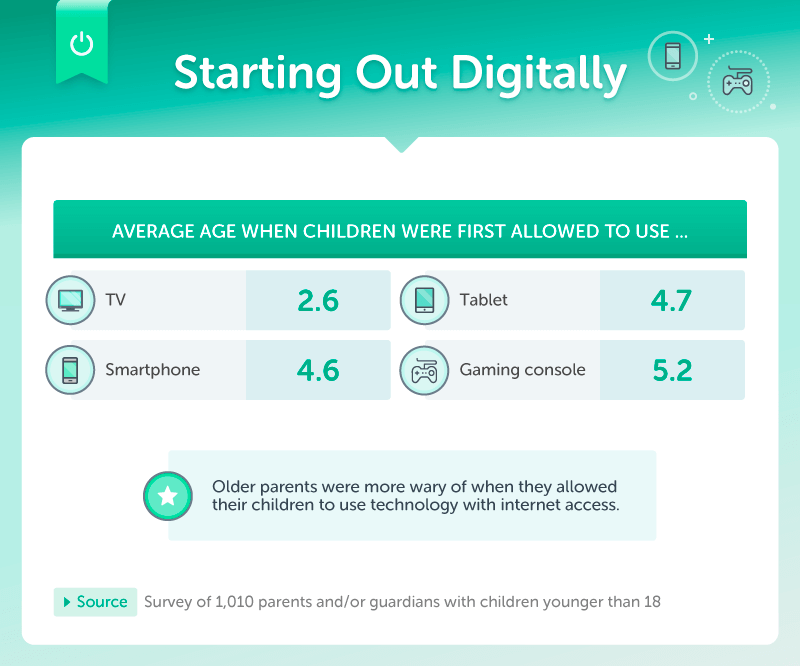
Parents' ages may have a lot to do with the way they enforce rules and how they interact with their children. This could be due to the generational gap between parents and children and also what parents experienced when they were kids.
Older generations – those who grew up during a more tech-free time – may not be as inclined to let their children use electronic devices at an early age, such as TV, smartphones, tablets, and gaming consoles, especially when it comes to the internet. Older parents were much more wary than younger generations of the ages at which they initially allowed their children to use these devices.
Technology for Education
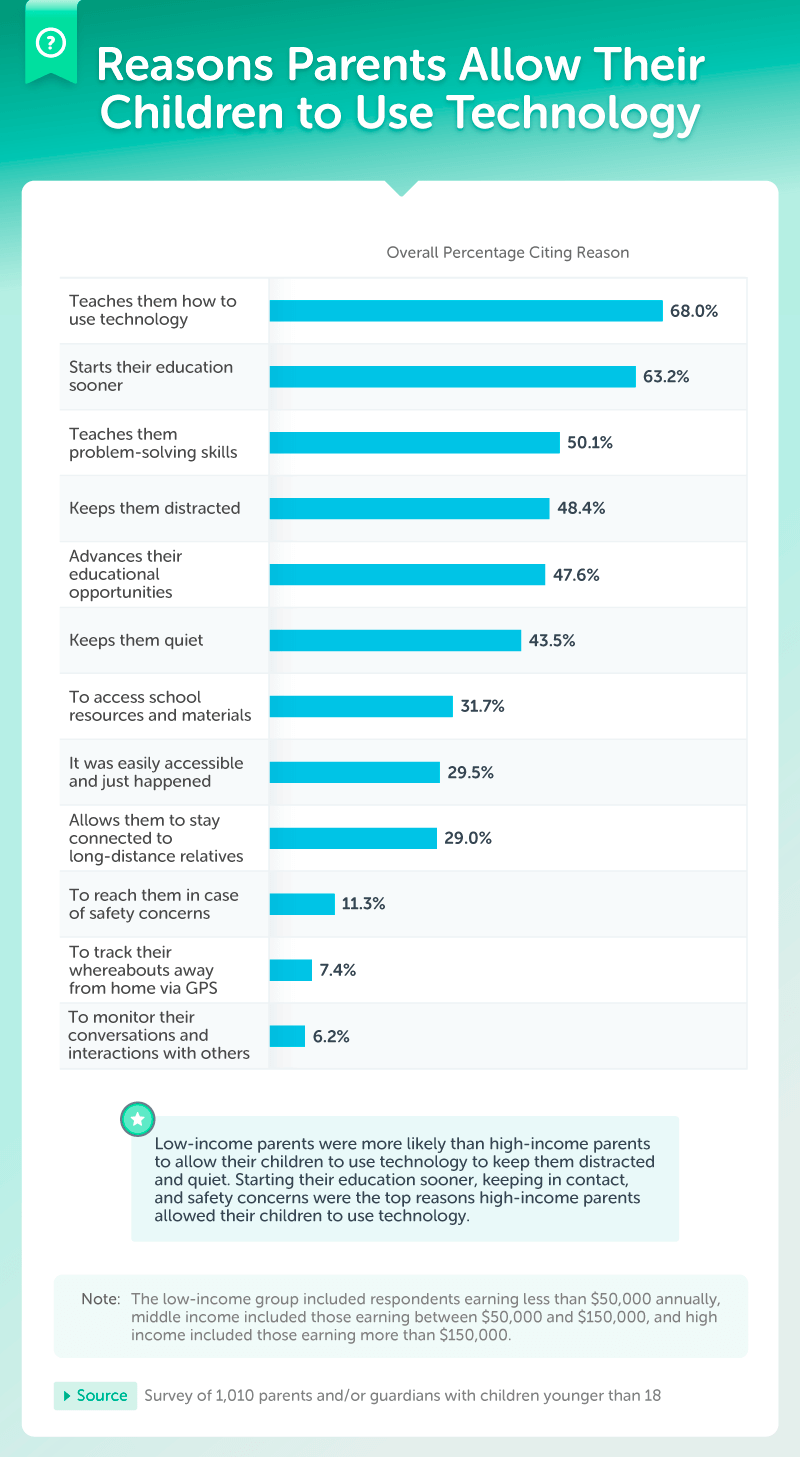
Despite the bad rap that some electronic devices get, technology does have its benefits, especially when it comes to educational matters. Parents, overall, were more likely to let their children use technology to further their education or increase their knowledge. The top three reasons included teaching them how to use technology (68%), starting their education sooner (around 63%), and teaching them problem-solving skills (about 50%). Almost 48% also believed that being introduced to technology helped to advance their children's educational opportunities.
Higher-earning parents were the most likely to give their children digital privileges to start their education sooner, stay connected to long-distance relatives, and reach them in the event of a safety concern. Low-income parents were more likely than others to use technology as a way to keep their children distracted or quiet.
Cautious With Age
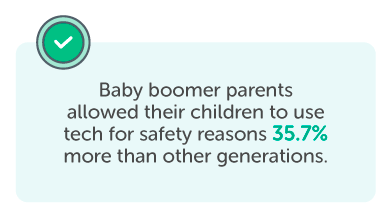
Not only do parents' ages have something to do with when they allow their children access to digital devices but also why they allow them access. Baby boomer parents showed the most concern for the safety of their children, as nearly 36% were more likely to allow their kids to use technology so they could reach them in the event of a safety concern.
Greater Income, More Concern?
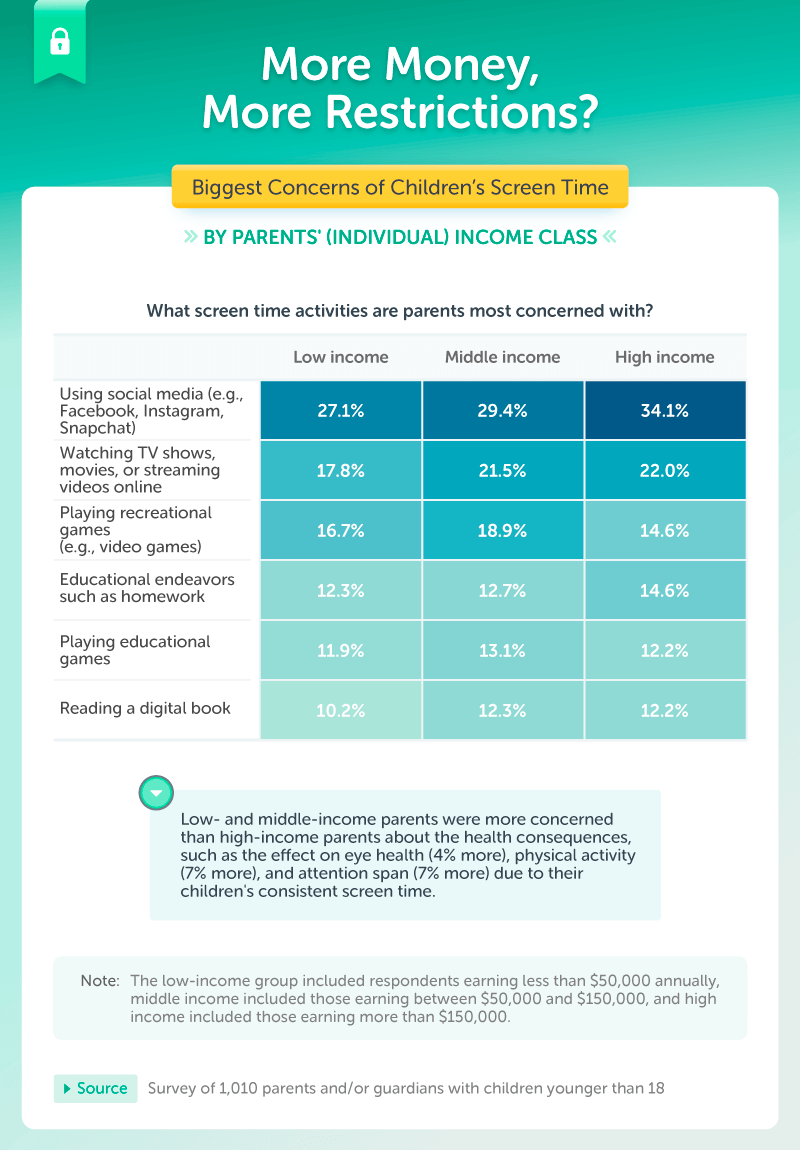
There is ongoing research that supports that the wealthier a parent is – such as Silicon Valley tech executives – the more concerned they are with the technology they allow into their children's daily life. High-income earners were most concerned with their children having too much screen time when it came to social media, watching TV or movies, and using digital devices for educational activities like homework.
High-income parents weren't alone with their top concern, however, as both low- and middle-income parents also considered social media their biggest worry when it came to their children's screen time. There is no doubt that technology has a great effect on the way adults approach parenting, no matter the income.
School Effect
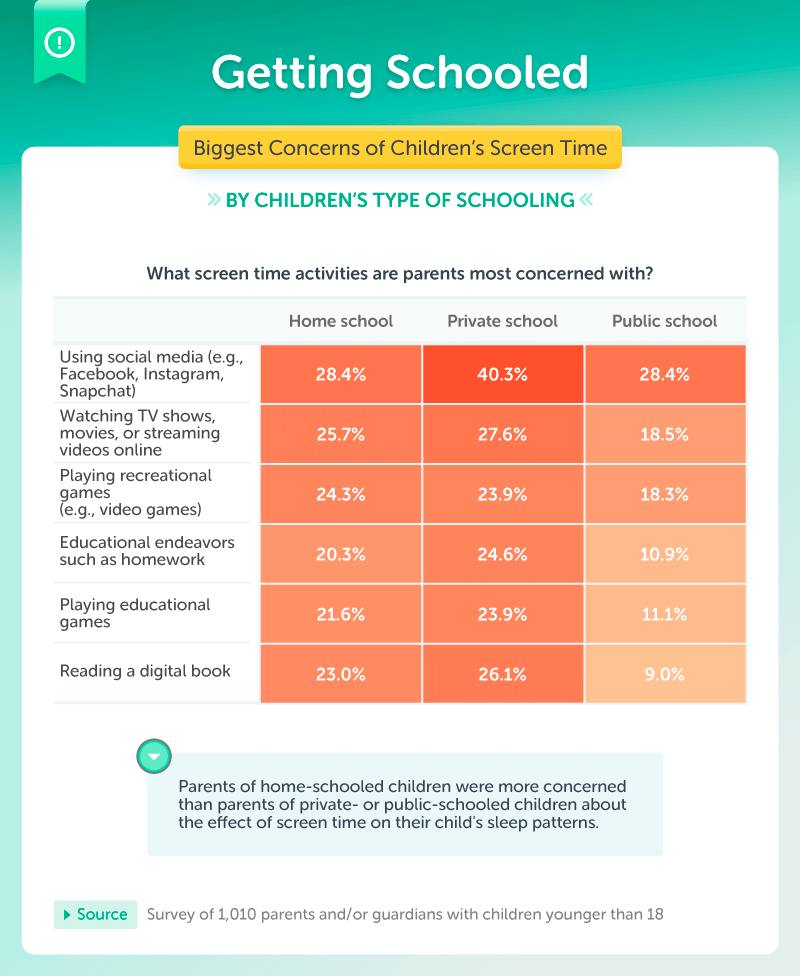
Parents who sent their children to private school or public school, as well as those who home-schooled their children, were the most concerned with their children's use of social media platforms such as Facebook, Instagram, and Snapchat. They were less concerned about the time their children spent playing recreational games – rather, this was a bigger concern for parents who home-schooled their children than either those in private or public school.
The effect on sleep was a big concern for parents of home-schooled children, but this didn't prove to be as much of an issue for parents of public- and private-schooled children.
Cause for Concern
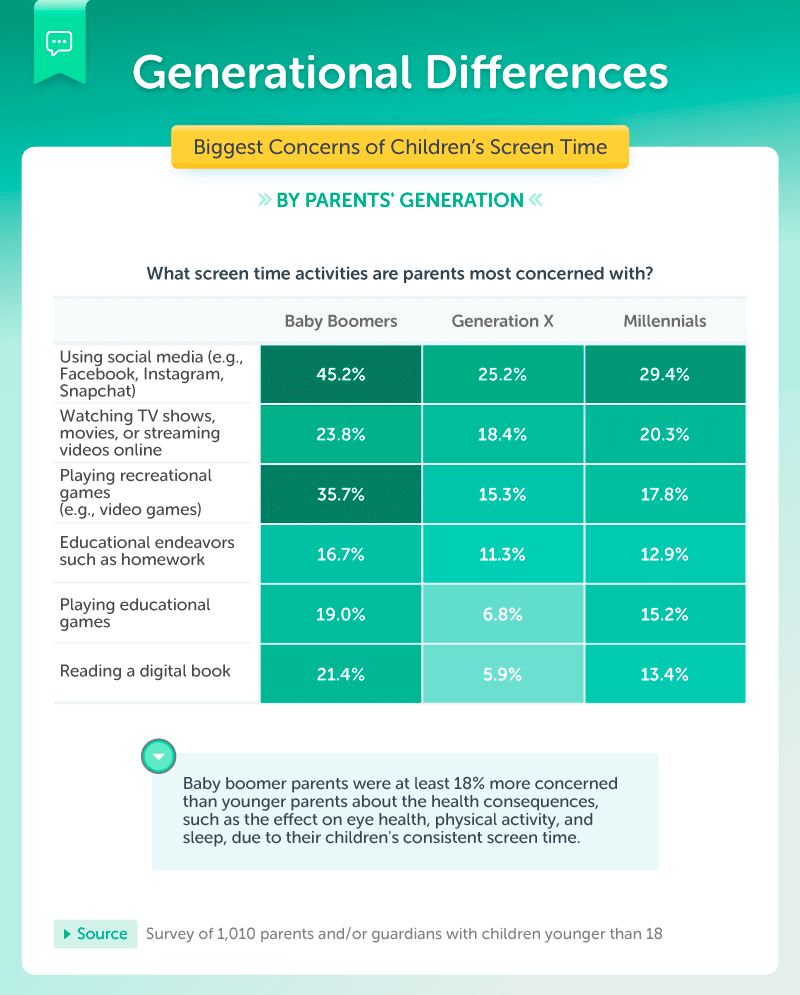
As we've explored, parental factors have a large effect on the technology children are exposed to and when. Adults may take cues from what they experienced when growing up, especially if the technology was a nonissue or didn't quite exist as it does in today's world. Baby boomers were at least 18% more concerned than the other two generations about these activities.
Overall, Gen Xers were the least concerned with screen time activities having a negative effect on their children. This generation seems to be the most comfortable with technology, as they were the first generation to grow up with digital devices and see them as an important part of their lives. To them, having access to technology may not be so much of a burden as it is helpful.
As for the reasons for concern, baby boomers were much more worried about their children's physical health, worrying about the effects of technology on their eye health and physical activity.
The Technological Effect
There are a lot of factors that come into play when parents decide how and when to "unplug" their children. Age, income, and education – it all can affect adults' parenting styles and, thus, how they raise their children. We've seen that a large amount of parents do, in fact, enforce rules regarding their children's screen time on a daily basis, and that high-income earners, parents who make more than $150,000, were more concerned with the physical and emotional dangers that screen time can have on their children, more so than low- and middle-income parents.
The higher earners, such as the Silicon Valley executives who sparked the interest in this topic, are more knowledgeable and aware of how these digital devices can affect children's developmental abilities and social skills, as these are the parents who are more likely to have experience with the devices themselves. As we can see, there is a considerable difference in the way parents feel about their children using electronics and technology.
At Typing.com, we know how crucial technology is to a child's development. With the right influence, the time a child spends utilizing technology can set them up for personal and professional success for years to come. Our interactive lessons, themed curriculums, and engaging modules help students of all ages develop strong typing skills they'll use for the rest of their life. Learn more about our customized learning opportunities at Typing.com.
Methodology and Limitations
This project was done with data compiled via a survey using Amazon's Mechanical Turk. Participants were parents of children aged 17 and younger. Parents of multiple children were prompted to answer questions based solely on their youngest child. 44.8% of respondents were men, and 55.2% were women. 60.5% were millennials, 35.3% belonged to Generation X, and 4.2% were baby boomers. 73.2% of respondents sent their only or youngest child to public school, 17.3% to private school, and 9.5% were home-schooled.
Income classes were grouped as such: The low-income group included respondents earning less than $50,000 annually, middle income included those earning between $50,000 and $150,000, and high income included those earning more than $150,000. 46.7% of participants fell into the low-income group, 49.2% in the middle-income group, and 4.1% in the high-income group.
Demographics below a sample size of 25 were excluded from the analysis. The data were not statistically tested apart from the graphic titled "Starting Out Digitally." As the data rely on self-reporting, there are issues that may be introduced such as selective memory or exaggeration. Future research could aim to explore parenting habits related to their child's technology use more granularly between varying income groups or even total household income.
Sources
- https://www.businessinsider.com/silicon-valley-parents-raising-their-kids-tech-free-red-flag-2018-2/
- https://www.verywellfamily.com/types-of-parenting-styles-1095045
- https://www.nosleeplessnights.com/sleep-hygiene/bedtime-routine-for-adults/
- https://www.hopkinsallchildrens.org/ACH-News/General-News/The-importance-of-sleep-for-kids
- https://www.psychologytoday.com/us/blog/nurturing-resilience/201902/does-screen-time-harm-children-how-much-is-too-much
- https://technologyaloha.com/millennials-baby-boomers-and-founders-oh-my/
- https://www.washingtonpost.com/lifestyle/2018/12/27/how-much-screentime-debate-all-parents-are-just-trying-figure-it-out/?utm_term=.b47ab2dc4a20
- https://newslanes.com/2019/02/26/debunking-the-myth-that-rich-parents-dont-want-ed-tech/
- https://www.thebalancecareers.com/common-characteristics-of-generation-x-professionals-2164682
- https://www.digitaltrends.com/home-theater/what-is-a-smart-tv/
Fair Use Statement
Are you a parent who's concerned with your child's screen time? If you think this information is worth sharing with others, please be sure to include a link back to this page so that readers know this is real information coming from a reliable source, and be sure to only share for noncommercial purposes.

 UK English
UK English
 Español
Español
 Português
Português



